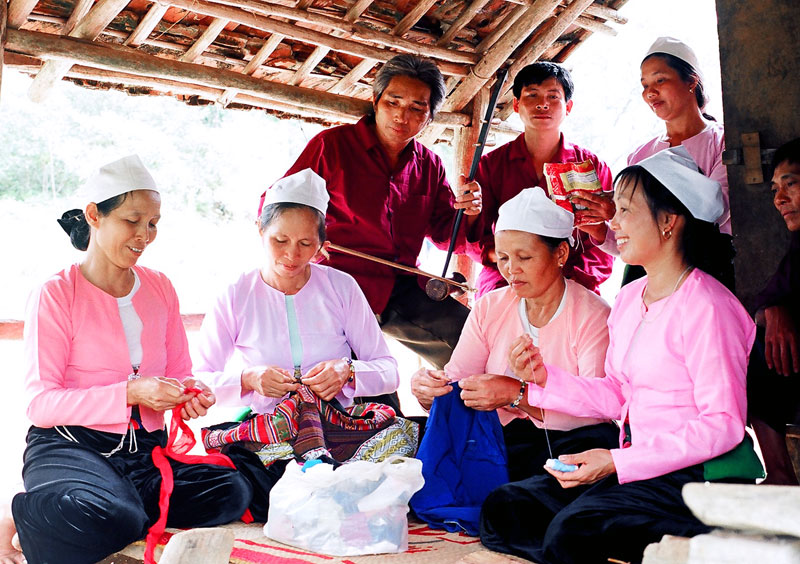
(HBO) - Every year, the province’s photographers have brought their art works to the photo contest of 15 northern mountainous provinces.
Since 1998, as many as 1,800 works by local photographers have been sent to the contest. The works mainly feature the culture, customs, practices and landscapes of the Muong land.
For photo contests in the province, local artists often participate irregularly, because there are few photo contest in the locality. From 1998 to 2018, only six contests were organized. However, the contests gathered many high-quality photos.
.
The photo "Hat thuong rang, bo meng” by a member of
the provincial photography association.
The
provincial photography association has 18 members, most of who are retirees or are
working in Hoa Binh city. To prepare for the contests, the association’s
members often go in groups to mountainous and remote areas of the locality, so
as to capture moments of the life there.
The photographers travel to Muong Bi, Muong Thang and Muong Vang to capture images
of the yellow carpet of ripe rice on terraced rice fields, hills covered by
ripe Cao Phong orange and Tan Lac pomelo.
They also cross
Thung Khe to visit Van, Lac and Pa Co villages in the faraway Mai Chau
district, where they can take photos of idyllic landscapes with vast forest,
and Tu, Lao and Dong Bang waterfalls.
In the last three years, the provincial literature and arts association has
no funds to open creative camps for members of the provincial photography association, but
with their own effortsand passion for capturing
the beauty of nature and human life in
villages and hamlets, localartists have taken many
beautiful photos, which wonmany
awards in regional contests.
Hoa Binh’s unique culture of various ethnic minority groups has created inspiration for local photographers. From 2016
- 2018, Hoa Binh photographers
sent 310 art works to the photo contest for artists from 15 provinces of the Northern
mountainous region. Two of
those won silver prizes, and five other photos were presented Consolation
prizes, while a total of 32 were selected for exhibitions./.
With an increasingly vibrant and widespread emulation movement aimed at building cultured residential areas and cultured families, Yen Thuy District has been making steady progress toward improving both the material and spiritual well-being of its people, while fostering a civilized, prosperous, beautiful, and progressive community.
Once lacking recreational spaces and community facilities, Residential Group 2 in Quynh Lam Ward (Hoa Binh City) has recently received attention for the construction of a new, spacious, and fully equipped cultural house. The project followed the model of state support combined with public contributions in both labor and funding.
The "All people unite to build cultural life" movement, which has been effectively integrated with Kim Boi district’s socio-economic development goals, is fostering a lively spirit of emulation across local residential areas, hamlets, villages, public agencies, and enterprises. In addition, through the initiative, traditional cultural values are being preserved and promoted, while community solidarity and mutual support in poverty reduction and economic development are being strengthened.
A working delegation of the Hoa Binh provincial People’s Committee led by its Permanent Vice Chairman Nguyen Van Toan on June 11 inspected the progress of a project to build the Mo Muong Cultural Heritage Conservation Space linked to tourism services in Hop Phong commune, Cao Phong district.
Born and growing in the heroic land of Muong Dong, Dinh Thi Kieu Dung, a resident in Bo town of Kim Boi district, in her childhood was nurtured by the sweet lullabies of her grandmother and mother. These melodies deeply imprinted on her soul, becoming an inseparable part of her love for her ethnic group's culture. For over 20 years, this love for her hometown has driven Dung to research, collect, and pass down the cultural values of the Muong people to future generations.
In the final days of May, the Ethnic Art Troupe of Hoa Binh Province organized performances to serve the people in remote, mountainous, and particularly disadvantaged areas within the province. These were not just ordinary artistic shows, but they were the meaningful journeys aimed at spreading cultural values, enhancing the spiritual life of the people and contributing to the preservation of ethnic minority cultural identities.



